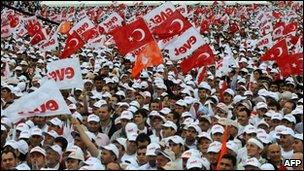Q&A: Turkey's constitutional referendum
- Published
The people of Turkey have backed the government's package of constitutional amendments in a referendum on the 30th anniversary of a coup that brought the military to power.

The referendum was seen partly as a vote of confidence in Premier Recep Tayyip Erdogan
What was decided?
Voters endorsed modifications to Turkey's current constitution, making the military more accountable to civilian courts and giving parliament - the 550-seat Gran National Assembly (Buyuk Millet Meclisi) - more power to appoint judges.
The amendments also relax restrictions on strike action, and grant civil servants the right to conclude collective agreements, as well as lifting immunity from prosecution for the leaders of the bloody 1980 military takeover.
The reforms are expected to finally dissociate EU-aspiring Turkey from the remnants of autocratic rule.
What else was at stake?
The referendum was also seen as a vote of confidence in Premier Recep Tayyip Erdogan, who is expected to seek a third term of office in 2011.
His critics accuse his ruling Justice and Development Party, the AKP, of attempting to seize control of the judiciary as part of a back-door Islamist coup.
The AKP says the reforms will pave the way for a reorganisation of the high courts and help meet requirements for EU membership.
The existing constitution, ratified in a referendum in 1982, has frequently been criticised as being outmoded and curtailing human rights.
The AKP sees the military, judiciary and state bureaucracy as the last bastion of conservative secularism. They are often seen as self-declared guardians of the legacy of the founder of the Turkish Republic, Mustafa Kemal Ataturk.
How many voters took part?
Almost 49.5 million people, out of Turkey's population of 74.8 million, were eligible to vote in the referendum.
Turnout was 78%, with provisional results suggesting about 58% voted "Yes" and 42% voted "No".
The highest number of "Yes" votes came from cities in Central Anatolia, and the highest number of "No" votes from cities in the Marmara region, including Istanbul.
What led up to the referendum?
The package of amendments was prepared by the AKP, which has wanted to change the constitution since it came to power in 2002.
It drew up a draft in 2007, but could not enlist the opposition's support for it. The party then prepared a list of partial amendments, which will be voted on in the upcoming plebiscite.
The package was passed by parliament in late April and early May 2010 with 336 votes, below the two-thirds majority necessary to pass it directly, but enough to send it to a referendum within 60 days after the president signed the law. President Abdullah Gul, of the AKP, signed it on 13 May 2010.
Who are the main critics of the vote?
Turkey's main opposition party - the Republican People's Party (CHP) - as well as the Nationalist Action Party (MHP), the pro-Kurdish Peace and Democracy Party (BDP), and the outlawed Kurdistan Workers' Party (PKK).
The CHP and MHP see the referendum as the AKP's attempt to politicise the judiciary and subordinate it to the executive branch.
The BDP and PKK have called for a boycott, saying the proposed constitutional reforms do not meet Kurdish needs for a brand new constitution.
BBC Monitoring, externalselects and translates news from radio, television, press, news agencies and the internet from 150 countries in more than 70 languages. It is based in Caversham, UK, and has several bureaux abroad.
- Published7 July 2010